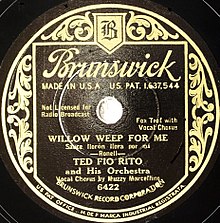Ted Fiorito
Ted Fiorito ( Ted Fio Rito , born Teodorico Salvatore Fiorito ; born December 20, 1900 in Newark / New Jersey , † July 22, 1971 in Scottsdale / Arizona ) was an American jazz pianist and composer.
Live and act
Fiorito began his career in 1919 as a pianist in Harry Yerkes' band and played shellac records a. a. with Earl Oliver , Tom Brown , Rudy Wiedoeft , Alcide Nunez , Joe and George Hamilton Green . In 1921 he went to Chicago where he was a member of Dan Russo's band and in the following year co-leader of the Russo and FioRito's Oriole Orchestra , which played in the Oriole Terrace in Detroit in 1922 and soon enjoyed success in the Midwest .
His reputation as a composer was based on the song "Toot Toot Tootsie, Goo'bye" recorded by Al Jolson , which became one of the great hits of the 1920s. This was followed by songs such as " When Lights Are Low " and " No, No, Nora " (both 1923), " Charley, My Boy ", "I Need Some Pettin '" (with Bix Beiderbecke and the Wolverine Orchestra ) and the jazz Standard " I Never Knew (That Roses Grew) " (1925). In 1928, "Laugh Clown Laugh" ( interpreted by Groucho Marx and Abbey Lincoln , among others ) and "King For A Day" (with Ted Lewis ) and in 1929 "Then You've Never Been Blue" followed. For the signature melody of his own orchestra, however, he made the third-party composition “Rio Rita”, probably because of the similarity with his own name; he also recorded the piece with his band singer Bob Carroll .
After separating from Dan Russo in 1928, Fiorito continued to work with his own band; it occurred predominantly in the Chicago and St. Louis area . The first radio recordings were made, played on the west coast in 1929 and performed in numerous cities in the USA in the following years. In 1931 he had an engagement in the Plantation Ballroom in Hollywood; there he appeared with his orchestra on a feature film. In 1932 he had a minor hit with Willow Weep for Me ; in the 1930s and 1940s he worked with his band in other films in addition to studio recordings and appearances on the west coast. During the Second World War he followed the trend of other dance bands and changed his orchestra style more towards swing . At the time, Patti Palmer, the future wife of comedian Jerry Lewis , was Fioritos singer. Shortly before the end of the war, June Haver took over her role.
In the post-war period, Fiorito returned to its original style. From 1950 to 1956 he was engaged in Las Vegas , then until 1962 he ran the Black Sheep Club in Scottsdale / Arizona ; at this time was little active as a musician. He then founded an ensemble with a smaller cast, with which he performed in California and Nevada until his death from a heart attack . In 2003, the album Never Been Blue was released 1922–1942 .
literature
- Leo Walker: The Big Band Almanac . Ward Ritchie Press, Pasadena. 1978
- Thomas A. DeLong: Radio Stars: An Illustrated Biographical Dictionary of 953 Performers, 1920 through 1960. McFarland & Company, 1996. ISBN 978-0-7864-2834-2 .
Web links
| personal data | |
|---|---|
| SURNAME | Fiorito, Ted |
| ALTERNATIVE NAMES | Fio Rito, Ted; Fiorito, Teodorico Salvatore (real name) |
| BRIEF DESCRIPTION | American jazz musician |
| DATE OF BIRTH | 20th December 1900 |
| PLACE OF BIRTH | Newark , New Jersey |
| DATE OF DEATH | July 22, 1971 |
| Place of death | Scottsdale , Arizona |
